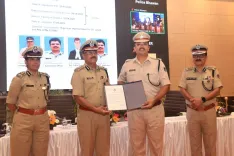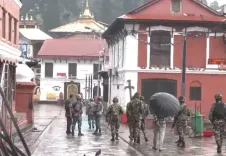Enforcement Directorate Raids Target Illegal Coal Mining in Assam and Meghalaya

Synopsis
Key Takeaways
- ED raids 15 locations in Assam and Meghalaya.
- Rs 1.58 crore in cash seized.
- Illegal coal mining operations involve 20 mines.
- Coal transported to various industries including illegal coke plants.
- Investigations into syndicate operations are ongoing.
New Delhi/Shillong, April 26 (NationPress) - The Enforcement Directorate (ED) has executed raids on 15 locations across Meghalaya and Assam in accordance with the Prevention of Money Laundering Act (PMLA), 2002, regarding the unlawful activities related to coal mining and illegal coke production within Meghalaya, as reported by official sources on Saturday.
During these operations, officials recovered Rs 1.58 crore in cash, along with digital devices such as laptops, diaries, mobile phones, and two luxury vehicles believed to have been acquired with Proceeds of Crime.
According to sources, testimonies from key individuals during the searches revealed that despite a prohibition on mining imposed over the past decade, illegal rat hole mining continued to be conducted under hazardous conditions, jeopardizing the safety of miners.
The investigation was initiated following an FIR lodged in Shallang, Meghalaya, under multiple sections of the IPC, 1860, MMDR Act, 2015, Environment (Protection) Act, 1986, Explosive Substances Act, 1883, and the Benami Transaction (Prohibition) Act, 1988.
The agency discovered that managers, heads of workers, and laborers were actively involved in illegal coal mining in the Jadigittim area of South Garo Hills using primitive equipment.
It was noted that close to 20 mines were operating unlawfully in the Era Aning and Goreng regions of South Garo Hills.
Some laborers were turned over to local law enforcement for questioning regarding their identities and nationality. A syndicate composed of individuals from Meghalaya and Assam was responsible for facilitating the passage of trucks loaded with illegal coal across the borders without scrutiny, with documentation created to falsely represent it as legally mined coal.
This syndicate charged between Rs 1.27 lakh to Rs 1.5 lakh per truck in commission fees, while the illegally mined coal was stored in depots situated in Jogighopa, Assam.
From these depots, coal was distributed to various industries such as the cement and brick-making sectors, as well as to illegal coke plants. Some coal was directly supplied to illegal coke operations from the northeastern depots.
Sources also indicated that those running the depot in Jogighopa were involved in generating fraudulent invoices that falsely indicated the coal was sourced from legitimate mines in Assam, thus masking the illegal activities.
Most financial transactions occurred in cash, with bogus invoices created to lend legitimacy to these dealings. The cash collected by the syndicate was stored by cash handlers, who were also scrutinized during the operation, resulting in the confiscation of diaries tracking cash movements.
It was further uncovered that coal mine operators coordinated with illegal mining entities in Margarita in Tinsukia, Assam, to create the illusion that the coal was mined legally.
Documents and statements from managers, mine owners, and laborers indicated that each mine was loading between five to seven trucks daily, with each truck transporting 12-16 tonnes of illegally mined coal.
The estimated volume of illegal coal extracted daily from the Era Aning and Goreng regions of South Garo Hills is approximately 1200 tonnes. Mine owners reportedly earned net profits of Rs 5000 to Rs 10,000 per truck after covering expenses.
Ongoing investigations are being conducted.
Following a decade-long ban on coal mining in Meghalaya, a scientific coal mining block in the state’s East Jaintia Hills District was inaugurated on March 17 by Chief Minister Conrad K Sangma.
A senior official from the government confirmed that the Ministry of Coal has sanctioned scientific coal mining operations in Meghalaya.
In April 2014, the National Green Tribunal (NGT) prohibited illegal coal mining, including the highly dangerous practice of rat-hole mining, characterizing it as 'unscientific' and 'extremely hazardous.'








